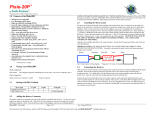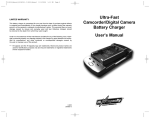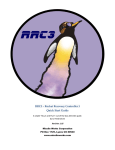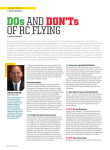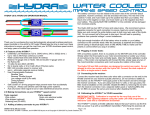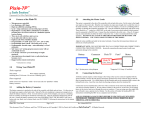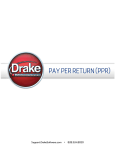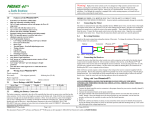Download Thunderbird-18 User Guide
Transcript
P/N: 010-0058-00 8 50866 00038 2 BRUSHLESS SPEED CONTROL THUNDERBIRD-18 ™ BRUSHLESS SPEED CONTROLLER Length: Width: Height: 1.32” (34mm) 0.9” (23mm) 0.33” (9mm) Weight: 0.6 oz (17 grams) Max amps: 18* Max volts: 15 volts 3S LiPo 10 NiCad/NiMh BEC: linear regulator 3 amp max Castle Link ™ Compatible NO PROGRAMMING NECESSARY 3S LIPO MAX 18 AMPS CONTINUOUS This product was assembled in the USA or Mexico of U.S. and imported parts. Castle Creations, Inc. warrants this product to be free from manufacturing defects for a period of one year from date of purchase. ™ *Current rating for full throttle operation with a 5 mph airflow over the controller. Safety First! Castle Creations, Inc., is not responsible for your use of this product, or for any damages or injuries you may cause or sustain as a result or its usage. An electric motor that is connected to a battery and speed control may start unexpectedly and cause serious injuries. Keep the propeller away from your body and others at all times. Always observe local laws regarding the operation of remote controlled aircraft. This product may contain chemicals known to the State of California to cause cancer and or birth defects or other reproductive harm. Do not ingest this controller, it may hurt you. ™ Changing Optional Settings on your Thunderbird castlecreations.com Couldn’t be easier! Auto-Lipo detect and no brake for 3D action right from the package! 1. Connect your Thunderbird You will need to solder connectors on your Thunderbird controller. Please refer to the diagram above. Double-check your battery polarity and connections before plugging a battery into your controller. There is no polarity for the three motor wires. If the motor spins the wrong way when power is applied, swap any two of the motor side connections and it will then spin properly. You may also use programming function 3, described below, to reverse the rotation via the controller’s software. NOTE TO FUTABA TRANSMITTER USERS – You may have to reverse the throttle direction of your radio. Please see your radio’s instructions on how to make this change. 2. Fly your Thunderbird Your Thunderbird comes ready to fly with Lithium Polymer type batteries. No settings changes are needed. To fly, turn your transmitter on before connecting your Thunderbird ESC to the motor battery. When you connect the motor battery to the Thunderbird ESC, you will hear an initialization tone from the motor and a series of beeps telling you how many Lithium Polymer cells in series are in your battery pack, and the servos will be active. Make sure that the number of beeps matches the number of cells in your pack. If it doesn’t, make sure your pack is fully charged. The Thunderbird will not arm unless you move your throttle stick to the lowest position. When the Thunderbird receives the low throttle command, it will arm and play a double tone through the motor, indicating it is armed and now ready to run. If this is the first time you are running the controller, advance the throttle slowly to ensure that the propeller rotation is correct. If it isn’t, correct as described above. ATTENTION LIPO FLIERS - Always follow your battery brand’s safety recommendations. Your Thunderbird is set at the factory to use a 3.0 volt per cell cutoff voltage. You may change this voltage setting using the Castle Link system (sold separately). You may change the Thunderbird’s settings for BATTERY TYPE, BRAKE BEHAVIOR, and MOTOR DIRECTION. We recommend that you use the Castle Link (sold separately) to make these changes using your PC. You may also change these settings using your radio and receiver. To change settings with your receiver, start with the motor battery unplugged and the transmitter ON. 1. Put the throttle stick in the full throttle (up) position. 2. Connect the Thunderbird ESC to a battery pack. 3. You should hear the first multi-tone ring upon plug in, and the battery count in beeps if set for Auto-Lipo. After 2 seconds, you should hear a second multi-tone ring, indicating the ESC sees full throttle. 4. Bring the throttle stick down to the middle position, and you will hear another ring. 5. Bring the throttle stick back to the top position, and you will hear another ring. 6. Bring the throttle stick to the middle position again, and you will hear 4 rings all in a row. Then the Thunderbird will make a single beep that repeats. This is setting question #1. What battery type? • For Lithium Polymer type batteries (default setting), move the stick up to full throttle and wait for the rapid beeps • For NiCad and NiMH type batteries, move the stick to low/off throttle and wait for the rapid beeps The rapid beeps tell you that the controller has now stored that answer in its memory. 7. You can now move the stick back to the middle position for question #2 Brake ON or OFF. The Thunderbird should start beeping two repeating beeps. This is setting question #2. Brake ON or OFF? •For Brake ON move the stick to full throttle, and wait for the rapid beeps •For Brake OFF (default setting), move the stick to low/off throttle, and wait for the rapid beeps The rapid beeps tell you that the controller has now stored that answer in its memory. 8. You can now move the stick back to the middle position for question #3 Rotation direction. The Thunderbird will start beeping three repeating beeps. This is setting question #3. Rotation Direction? •For rotation forward (default setting), move the stick to full throttle, and wait for the rapid beeps •For rotation reversed, move the stick to low/off throttle, and wait for the rapid beeps The rapid beeps tell you that the controller has now stored that answer in its memory. After the last setting is made, the controller will exit programming mode, and will arm when the throttle is in the low position. For troubleshooting, warranty information, or technical support, please contact us at: (913) 390-6939 or castlecreations.com. © 2008 Castle Creations, Inc. 095-0032-00 Revision date - 09/2008



